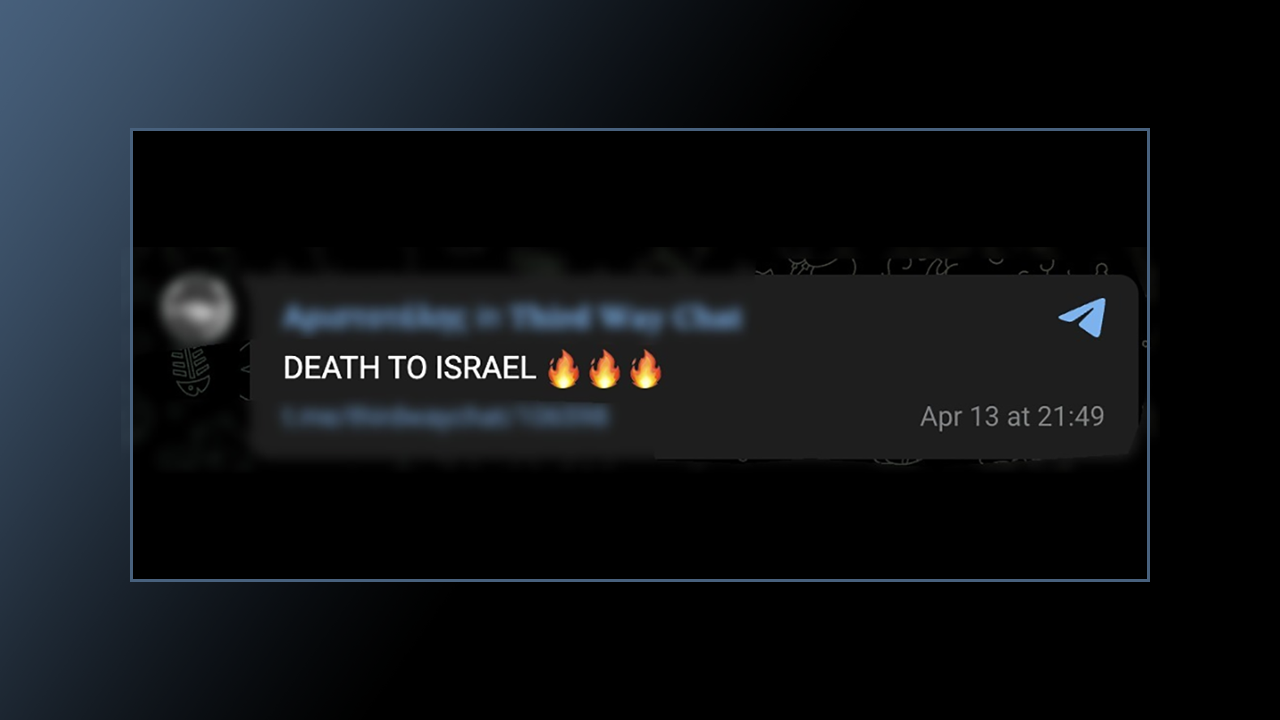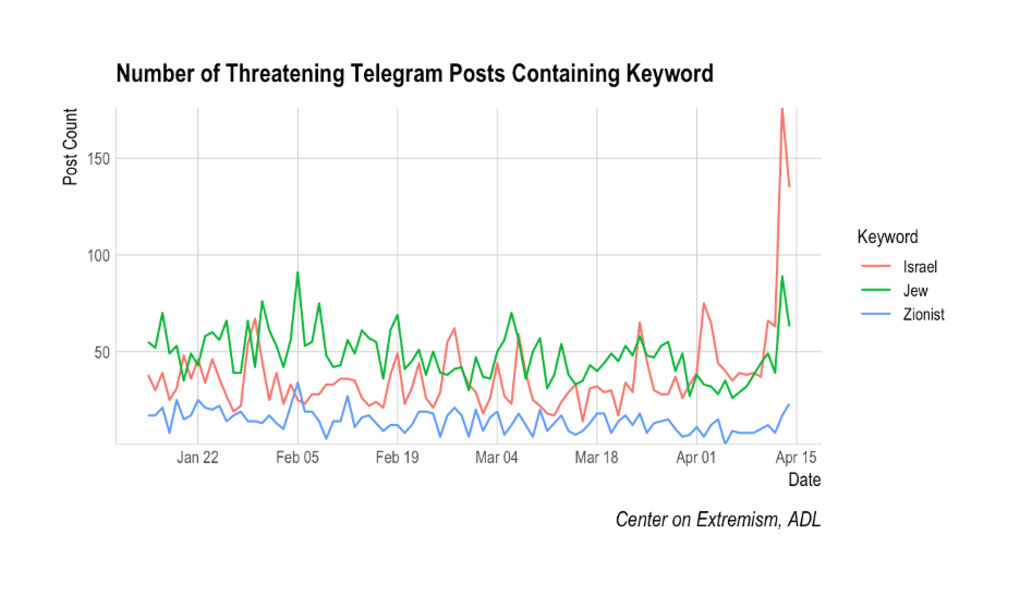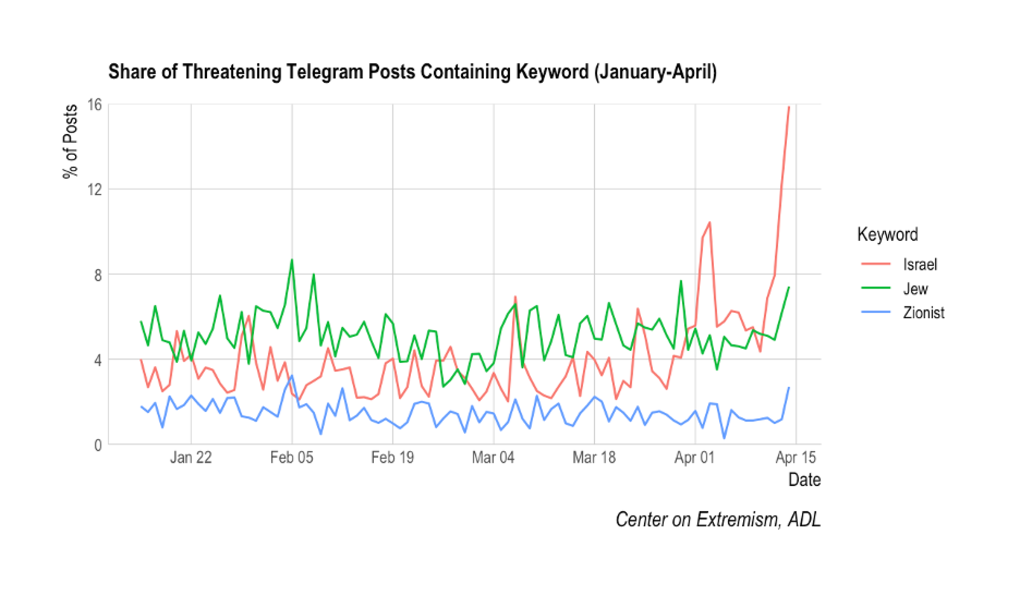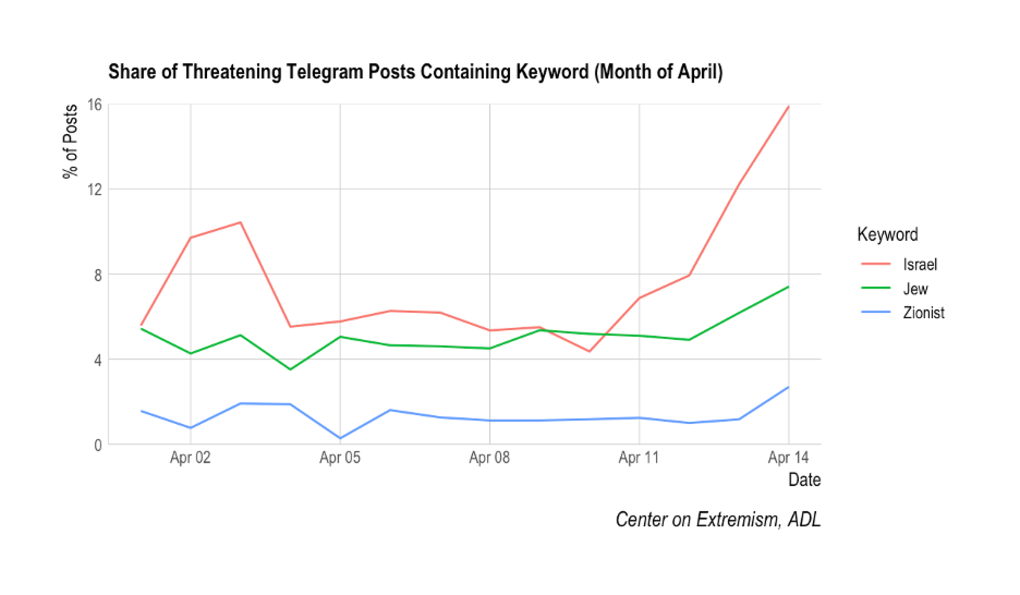
Image source: Telegram
A new analysis by the ADL Center on Extremism (COE) has found that online expressions of antisemitism on Telegram, a prominent messaging platform frequented by purveyors of hate speech, increased dramatically in the days following the Iranian regime's unprecedented assault on Israel on April 13, 2024. The weekend attack consisted of some 300 drones, cruise missiles and ballistic missiles. The Iranian regime’s Lebanese proxy Hezbollah and other Tehran-backed militias based in Iraq, Syria and Yemen also fired weapons at Israel.
Overall, COE’s findings suggest that antisemitic individuals from a range of ideologies feel emboldened and inspired by the Iranian regime's attack with a noticeable uptick in online threats targeting Jews and Israelis. This surge appears to reflect concerning coalitions between groups with different antisemitic ideologies.
Telegram, where content moderation is notoriously weak, boasts hundreds of millions of active users. To process the sheer number of posts, which can number in the tens of thousands per day, COE focused its Telegram monitoring efforts on approximately 2,000 extremist channels covering a wide range of ideologies, including right-wing, left-wing and Islamist extremism, as well as conspiracy theories, and anti-Israel and anti-Zionist sentiment. However, white supremacist extremist ideology makes up the majority of the channels COE monitors.
To conduct its analysis, COE utilized a proprietary methodology that leverages machine learning models and various other data science techniques to find targeted threats against Jews and Israelis and eliminate irrelevant messages (such as excerpts from news articles that quote threatening language used by others but are not themselves threatening). This methodology captured most threat instances and was validated quantitatively and qualitatively by subject matter experts. In addition to using this type of machine learning to focus on the most pressing threats, COE confirmed the targets of threatening messages based on the keywords they contain, the channel in which they were posted and by qualitative expert classification.
From April 1 to April 14, 2024, threatening Telegram messages specifically targeting Jews -- already at an elevated level following the October 7, 2023, attacks against Israel – rose considerably. The number of antisemitic threats mentioning Jews was up 64.1%, to 64 per day from April 1 to April 14. Meanwhile, the number of threats that mentioned “Zionists” was up 109.1%, to 23 per day by April 14, and the number of threats that specifically mentioned “Israel” was up 242.5%, to 137 daily posts in that same timeframe. By April 14, nearly 16% of all threatening messages from the monitored Telegram channels targeted Israel. (These numbers are very likely undercounts, as antisemitism is often cloaked in coded speech that is more difficult to detect).



These messages not only traffic in traditional antisemitic tropes and propaganda, they also include expressions of sympathy (and praise) for the Iranian regime and its allies, as well as celebrations of violence against Israelis and Jews.



Such expressions at times transcend typical ideological divisions: Some messages imply that individuals who are otherwise unsympathetic to the Iranian regime would take their side in a conflict with Israel.

Finally, in addition to examining the content of threatening antisemitic posts, COE was able to pin down the specific channels accounting for the increase. COE analyzed Telegram data from the days surrounding the Iranian regime's attack against data that preceded it to understand which channels were seeing surges.
On many of the channels identified in the analysis, antisemitic threats and calls for violence are par for the course. However, the concentration of activity on these few toxic channels is striking. COE's analysis found the top five Telegram channels that, together, account for over 45% of the increase in threatening antisemitic posts:
Homework Helpers 88 – Chat, a Telegram account (with a white supremacist callout in its name) associated with a network of online trolls who livestream themselves spreading antisemitic and white supremacist sentiments through online video chat websites, including monkey.app and the now-defunct Omegle.
GDL Chat 2.0, a channel where individuals associated with the antisemitic Goyim Defense League share their extremist views and activities.
Professional cyberbullying Russians, a channel where far-right pro-Ukraine users share "pro-white" memes and engage in networking.
Global Resistance News (also known as Cultures of Resistance), an antisemitic, anti-Zionist Telegram channel which has called for “death and nothing but death to Zion.”
GHOSTCHAT, a channel associated with antisemitic influencer GhostEzra (aka Robert Smart of Florida), where users regularly express antisemitic, neo-Nazi and other hateful and extremist views.
Top Channels for Increased Antisemitic Activity | |
|---|---|
Channel | Percentage of Total Increase in Antisemitic Posts |
1. Homework Helpers 88 - Chat | 13.45% |
2. GDL Chat 2.0 | 9.93% |
3. Professional cyberbullying Russians | 8.86% |
4. Global Resistance News | 7.94% |
5. GHOSTCHAT | 5.51% |
Overall, antisemitic threats on Telegram increased since April 1, 2024, pointing to a broad coalition of antisemites united by their shared vitriol towards Jews and Israel.
The sharp rise in antisemitic threats online after the Iranian regime's attack on Israel shows how a major world event can encourage widespread expressions of antisemitism. Our findings, which are not exhaustive, suggest a correlation between the increase in threats against Israel and a rise in threats targeting Jews and Zionists in the U.S. and elsewhere, including those with no direct connection to Israel. The Iranian regime's attack on Israel, which has undermined regional stability, may also embolden groups and individuals to act on their antisemitic beliefs.